Psychotherapy Comparison Essay: Evaluating Three Major Approaches
VerifiedAdded on 2023/06/14
|7
|2016
|380
Essay
AI Summary
This essay provides a comparative analysis of three major psychotherapeutic approaches: Person-Centered Therapy, Existential Therapy, and Transactional Analysis (TA). It evaluates counselling within the humanistic tradition, examining the therapeutic relationship and process for each therapy. The essay discusses how each approach can be applied to meet specific client needs, highlighting the importance of understanding human behavior and tailoring therapeutic interventions. It further explores the stages of therapeutic process, including commitment, process, change, and termination, emphasizing the therapist's role in fostering client independence and well-being. The study concludes that these psychotherapies play a vital role in changing client behavior, promoting positive mental and emotional health, and making them independent.
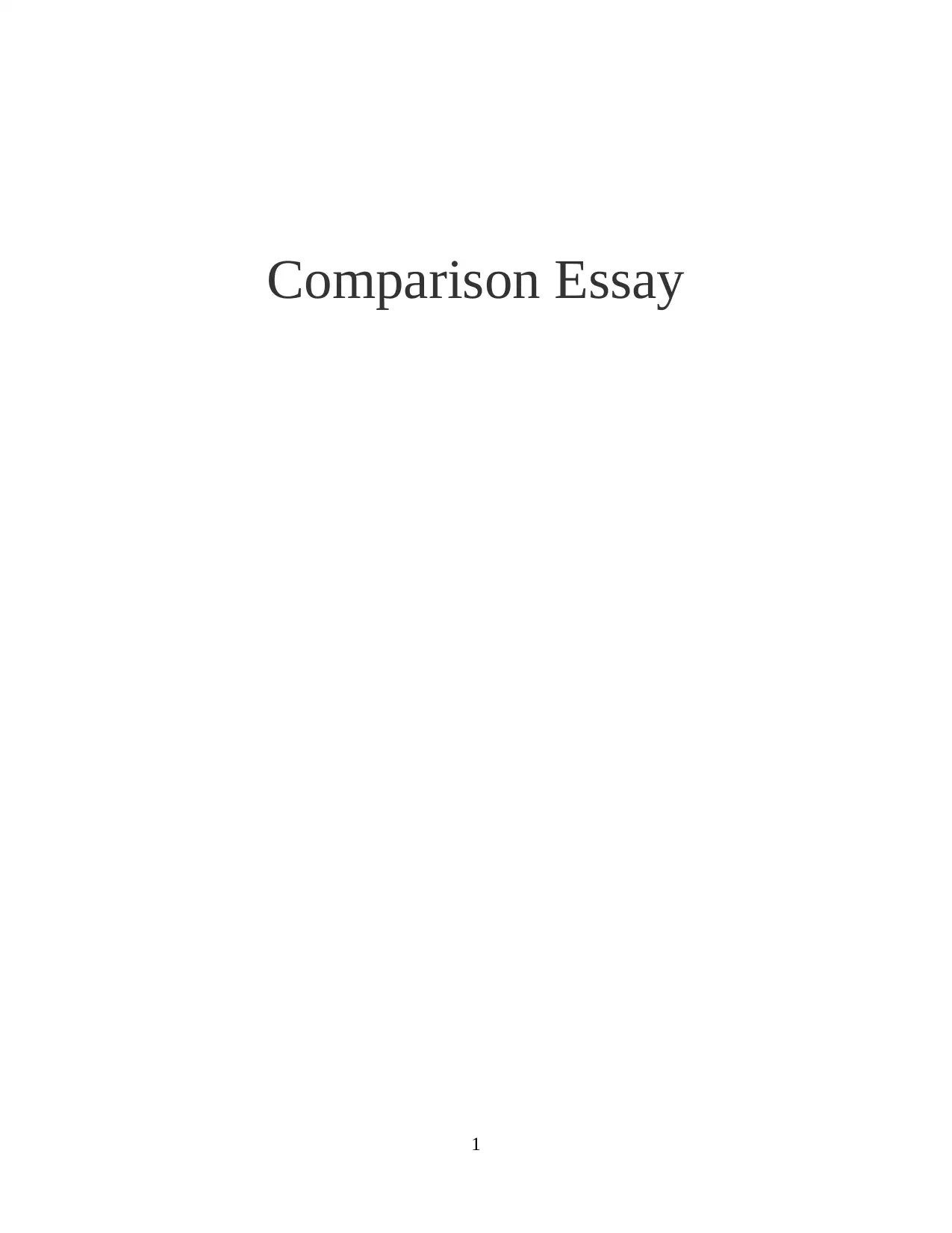
Comparison Essay
1
1
Paraphrase This Document
Need a fresh take? Get an instant paraphrase of this document with our AI Paraphraser
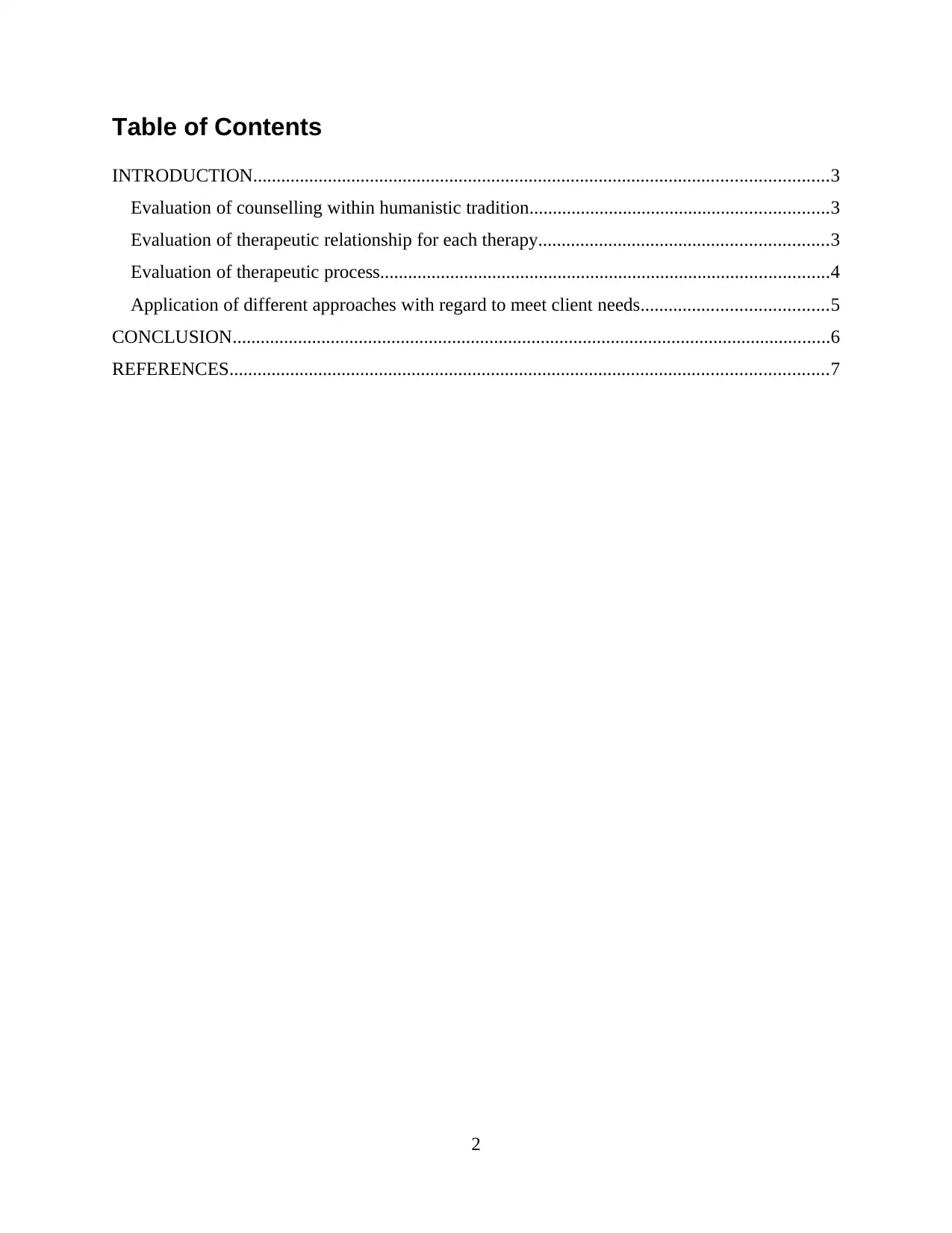
Table of Contents
INTRODUCTION...........................................................................................................................3
Evaluation of counselling within humanistic tradition................................................................3
Evaluation of therapeutic relationship for each therapy..............................................................3
Evaluation of therapeutic process................................................................................................4
Application of different approaches with regard to meet client needs........................................5
CONCLUSION................................................................................................................................6
REFERENCES................................................................................................................................7
2
INTRODUCTION...........................................................................................................................3
Evaluation of counselling within humanistic tradition................................................................3
Evaluation of therapeutic relationship for each therapy..............................................................3
Evaluation of therapeutic process................................................................................................4
Application of different approaches with regard to meet client needs........................................5
CONCLUSION................................................................................................................................6
REFERENCES................................................................................................................................7
2
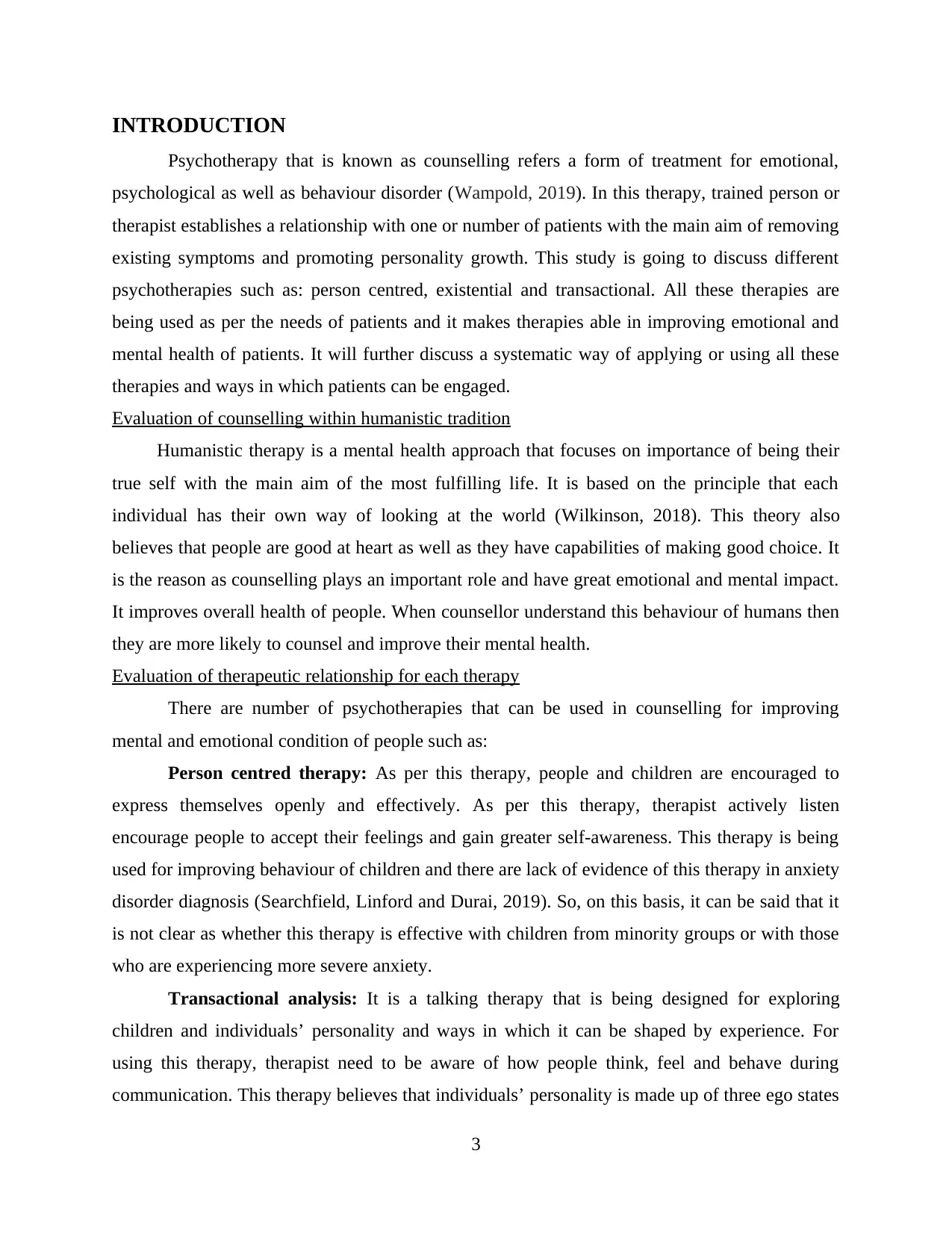
INTRODUCTION
Psychotherapy that is known as counselling refers a form of treatment for emotional,
psychological as well as behaviour disorder (Wampold, 2019). In this therapy, trained person or
therapist establishes a relationship with one or number of patients with the main aim of removing
existing symptoms and promoting personality growth. This study is going to discuss different
psychotherapies such as: person centred, existential and transactional. All these therapies are
being used as per the needs of patients and it makes therapies able in improving emotional and
mental health of patients. It will further discuss a systematic way of applying or using all these
therapies and ways in which patients can be engaged.
Evaluation of counselling within humanistic tradition
Humanistic therapy is a mental health approach that focuses on importance of being their
true self with the main aim of the most fulfilling life. It is based on the principle that each
individual has their own way of looking at the world (Wilkinson, 2018). This theory also
believes that people are good at heart as well as they have capabilities of making good choice. It
is the reason as counselling plays an important role and have great emotional and mental impact.
It improves overall health of people. When counsellor understand this behaviour of humans then
they are more likely to counsel and improve their mental health.
Evaluation of therapeutic relationship for each therapy
There are number of psychotherapies that can be used in counselling for improving
mental and emotional condition of people such as:
Person centred therapy: As per this therapy, people and children are encouraged to
express themselves openly and effectively. As per this therapy, therapist actively listen
encourage people to accept their feelings and gain greater self-awareness. This therapy is being
used for improving behaviour of children and there are lack of evidence of this therapy in anxiety
disorder diagnosis (Searchfield, Linford and Durai, 2019). So, on this basis, it can be said that it
is not clear as whether this therapy is effective with children from minority groups or with those
who are experiencing more severe anxiety.
Transactional analysis: It is a talking therapy that is being designed for exploring
children and individuals’ personality and ways in which it can be shaped by experience. For
using this therapy, therapist need to be aware of how people think, feel and behave during
communication. This therapy believes that individuals’ personality is made up of three ego states
3
Psychotherapy that is known as counselling refers a form of treatment for emotional,
psychological as well as behaviour disorder (Wampold, 2019). In this therapy, trained person or
therapist establishes a relationship with one or number of patients with the main aim of removing
existing symptoms and promoting personality growth. This study is going to discuss different
psychotherapies such as: person centred, existential and transactional. All these therapies are
being used as per the needs of patients and it makes therapies able in improving emotional and
mental health of patients. It will further discuss a systematic way of applying or using all these
therapies and ways in which patients can be engaged.
Evaluation of counselling within humanistic tradition
Humanistic therapy is a mental health approach that focuses on importance of being their
true self with the main aim of the most fulfilling life. It is based on the principle that each
individual has their own way of looking at the world (Wilkinson, 2018). This theory also
believes that people are good at heart as well as they have capabilities of making good choice. It
is the reason as counselling plays an important role and have great emotional and mental impact.
It improves overall health of people. When counsellor understand this behaviour of humans then
they are more likely to counsel and improve their mental health.
Evaluation of therapeutic relationship for each therapy
There are number of psychotherapies that can be used in counselling for improving
mental and emotional condition of people such as:
Person centred therapy: As per this therapy, people and children are encouraged to
express themselves openly and effectively. As per this therapy, therapist actively listen
encourage people to accept their feelings and gain greater self-awareness. This therapy is being
used for improving behaviour of children and there are lack of evidence of this therapy in anxiety
disorder diagnosis (Searchfield, Linford and Durai, 2019). So, on this basis, it can be said that it
is not clear as whether this therapy is effective with children from minority groups or with those
who are experiencing more severe anxiety.
Transactional analysis: It is a talking therapy that is being designed for exploring
children and individuals’ personality and ways in which it can be shaped by experience. For
using this therapy, therapist need to be aware of how people think, feel and behave during
communication. This therapy believes that individuals’ personality is made up of three ego states
3
⊘ This is a preview!⊘
Do you want full access?
Subscribe today to unlock all pages.

Trusted by 1+ million students worldwide
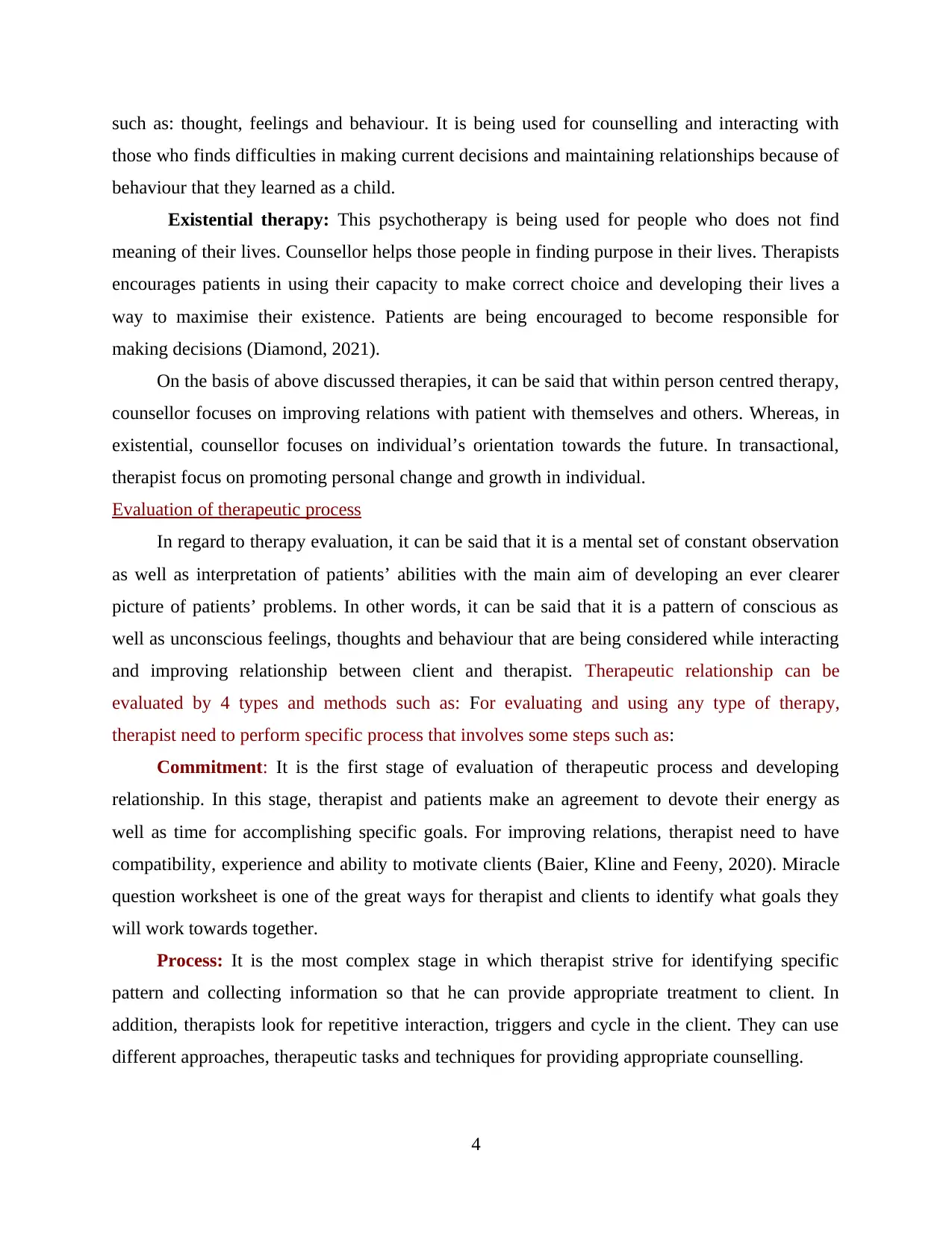
such as: thought, feelings and behaviour. It is being used for counselling and interacting with
those who finds difficulties in making current decisions and maintaining relationships because of
behaviour that they learned as a child.
Existential therapy: This psychotherapy is being used for people who does not find
meaning of their lives. Counsellor helps those people in finding purpose in their lives. Therapists
encourages patients in using their capacity to make correct choice and developing their lives a
way to maximise their existence. Patients are being encouraged to become responsible for
making decisions (Diamond, 2021).
On the basis of above discussed therapies, it can be said that within person centred therapy,
counsellor focuses on improving relations with patient with themselves and others. Whereas, in
existential, counsellor focuses on individual’s orientation towards the future. In transactional,
therapist focus on promoting personal change and growth in individual.
Evaluation of therapeutic process
In regard to therapy evaluation, it can be said that it is a mental set of constant observation
as well as interpretation of patients’ abilities with the main aim of developing an ever clearer
picture of patients’ problems. In other words, it can be said that it is a pattern of conscious as
well as unconscious feelings, thoughts and behaviour that are being considered while interacting
and improving relationship between client and therapist. Therapeutic relationship can be
evaluated by 4 types and methods such as: For evaluating and using any type of therapy,
therapist need to perform specific process that involves some steps such as:
Commitment: It is the first stage of evaluation of therapeutic process and developing
relationship. In this stage, therapist and patients make an agreement to devote their energy as
well as time for accomplishing specific goals. For improving relations, therapist need to have
compatibility, experience and ability to motivate clients (Baier, Kline and Feeny, 2020). Miracle
question worksheet is one of the great ways for therapist and clients to identify what goals they
will work towards together.
Process: It is the most complex stage in which therapist strive for identifying specific
pattern and collecting information so that he can provide appropriate treatment to client. In
addition, therapists look for repetitive interaction, triggers and cycle in the client. They can use
different approaches, therapeutic tasks and techniques for providing appropriate counselling.
4
those who finds difficulties in making current decisions and maintaining relationships because of
behaviour that they learned as a child.
Existential therapy: This psychotherapy is being used for people who does not find
meaning of their lives. Counsellor helps those people in finding purpose in their lives. Therapists
encourages patients in using their capacity to make correct choice and developing their lives a
way to maximise their existence. Patients are being encouraged to become responsible for
making decisions (Diamond, 2021).
On the basis of above discussed therapies, it can be said that within person centred therapy,
counsellor focuses on improving relations with patient with themselves and others. Whereas, in
existential, counsellor focuses on individual’s orientation towards the future. In transactional,
therapist focus on promoting personal change and growth in individual.
Evaluation of therapeutic process
In regard to therapy evaluation, it can be said that it is a mental set of constant observation
as well as interpretation of patients’ abilities with the main aim of developing an ever clearer
picture of patients’ problems. In other words, it can be said that it is a pattern of conscious as
well as unconscious feelings, thoughts and behaviour that are being considered while interacting
and improving relationship between client and therapist. Therapeutic relationship can be
evaluated by 4 types and methods such as: For evaluating and using any type of therapy,
therapist need to perform specific process that involves some steps such as:
Commitment: It is the first stage of evaluation of therapeutic process and developing
relationship. In this stage, therapist and patients make an agreement to devote their energy as
well as time for accomplishing specific goals. For improving relations, therapist need to have
compatibility, experience and ability to motivate clients (Baier, Kline and Feeny, 2020). Miracle
question worksheet is one of the great ways for therapist and clients to identify what goals they
will work towards together.
Process: It is the most complex stage in which therapist strive for identifying specific
pattern and collecting information so that he can provide appropriate treatment to client. In
addition, therapists look for repetitive interaction, triggers and cycle in the client. They can use
different approaches, therapeutic tasks and techniques for providing appropriate counselling.
4
Paraphrase This Document
Need a fresh take? Get an instant paraphrase of this document with our AI Paraphraser
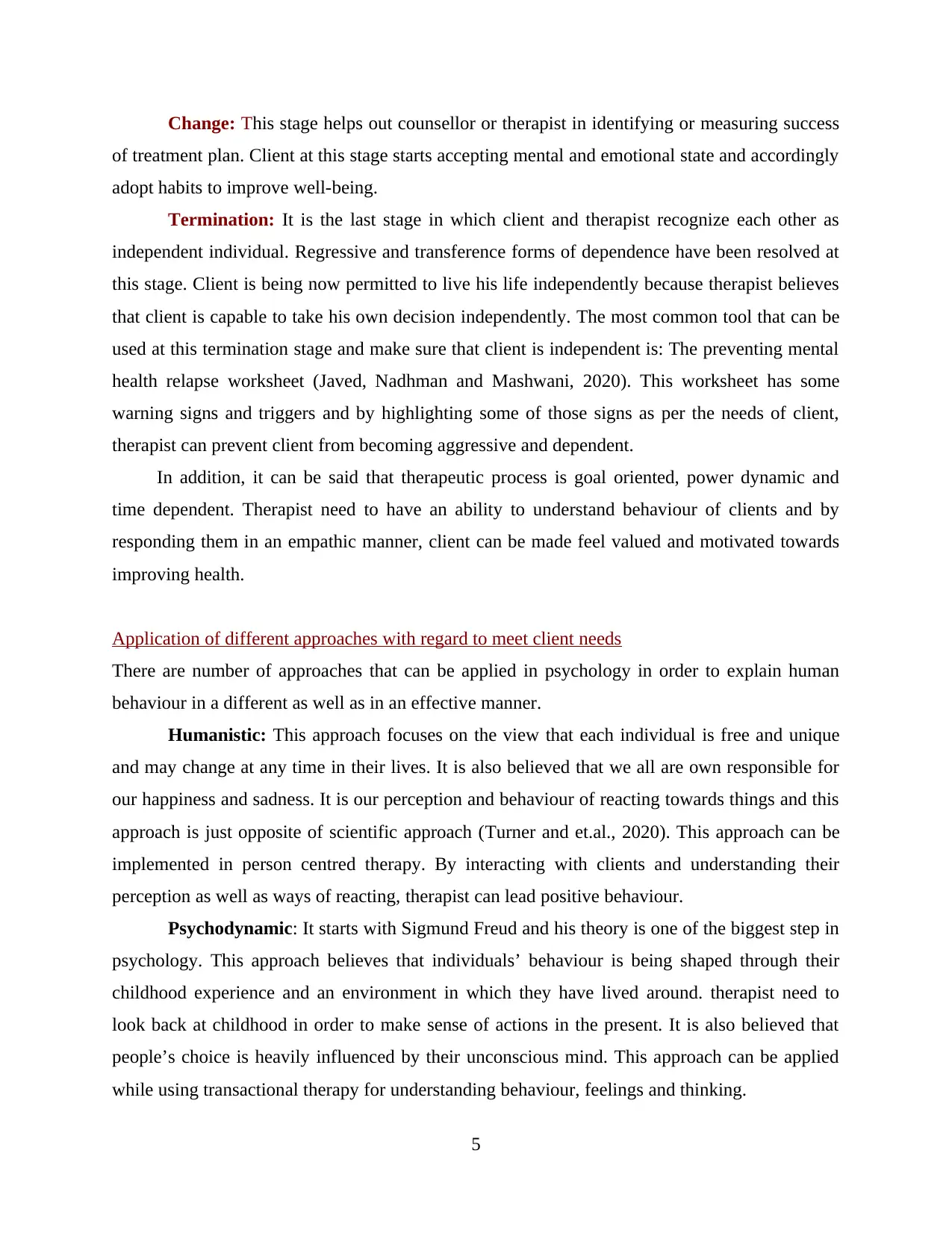
Change: This stage helps out counsellor or therapist in identifying or measuring success
of treatment plan. Client at this stage starts accepting mental and emotional state and accordingly
adopt habits to improve well-being.
Termination: It is the last stage in which client and therapist recognize each other as
independent individual. Regressive and transference forms of dependence have been resolved at
this stage. Client is being now permitted to live his life independently because therapist believes
that client is capable to take his own decision independently. The most common tool that can be
used at this termination stage and make sure that client is independent is: The preventing mental
health relapse worksheet (Javed, Nadhman and Mashwani, 2020). This worksheet has some
warning signs and triggers and by highlighting some of those signs as per the needs of client,
therapist can prevent client from becoming aggressive and dependent.
In addition, it can be said that therapeutic process is goal oriented, power dynamic and
time dependent. Therapist need to have an ability to understand behaviour of clients and by
responding them in an empathic manner, client can be made feel valued and motivated towards
improving health.
Application of different approaches with regard to meet client needs
There are number of approaches that can be applied in psychology in order to explain human
behaviour in a different as well as in an effective manner.
Humanistic: This approach focuses on the view that each individual is free and unique
and may change at any time in their lives. It is also believed that we all are own responsible for
our happiness and sadness. It is our perception and behaviour of reacting towards things and this
approach is just opposite of scientific approach (Turner and et.al., 2020). This approach can be
implemented in person centred therapy. By interacting with clients and understanding their
perception as well as ways of reacting, therapist can lead positive behaviour.
Psychodynamic: It starts with Sigmund Freud and his theory is one of the biggest step in
psychology. This approach believes that individuals’ behaviour is being shaped through their
childhood experience and an environment in which they have lived around. therapist need to
look back at childhood in order to make sense of actions in the present. It is also believed that
people’s choice is heavily influenced by their unconscious mind. This approach can be applied
while using transactional therapy for understanding behaviour, feelings and thinking.
5
of treatment plan. Client at this stage starts accepting mental and emotional state and accordingly
adopt habits to improve well-being.
Termination: It is the last stage in which client and therapist recognize each other as
independent individual. Regressive and transference forms of dependence have been resolved at
this stage. Client is being now permitted to live his life independently because therapist believes
that client is capable to take his own decision independently. The most common tool that can be
used at this termination stage and make sure that client is independent is: The preventing mental
health relapse worksheet (Javed, Nadhman and Mashwani, 2020). This worksheet has some
warning signs and triggers and by highlighting some of those signs as per the needs of client,
therapist can prevent client from becoming aggressive and dependent.
In addition, it can be said that therapeutic process is goal oriented, power dynamic and
time dependent. Therapist need to have an ability to understand behaviour of clients and by
responding them in an empathic manner, client can be made feel valued and motivated towards
improving health.
Application of different approaches with regard to meet client needs
There are number of approaches that can be applied in psychology in order to explain human
behaviour in a different as well as in an effective manner.
Humanistic: This approach focuses on the view that each individual is free and unique
and may change at any time in their lives. It is also believed that we all are own responsible for
our happiness and sadness. It is our perception and behaviour of reacting towards things and this
approach is just opposite of scientific approach (Turner and et.al., 2020). This approach can be
implemented in person centred therapy. By interacting with clients and understanding their
perception as well as ways of reacting, therapist can lead positive behaviour.
Psychodynamic: It starts with Sigmund Freud and his theory is one of the biggest step in
psychology. This approach believes that individuals’ behaviour is being shaped through their
childhood experience and an environment in which they have lived around. therapist need to
look back at childhood in order to make sense of actions in the present. It is also believed that
people’s choice is heavily influenced by their unconscious mind. This approach can be applied
while using transactional therapy for understanding behaviour, feelings and thinking.
5
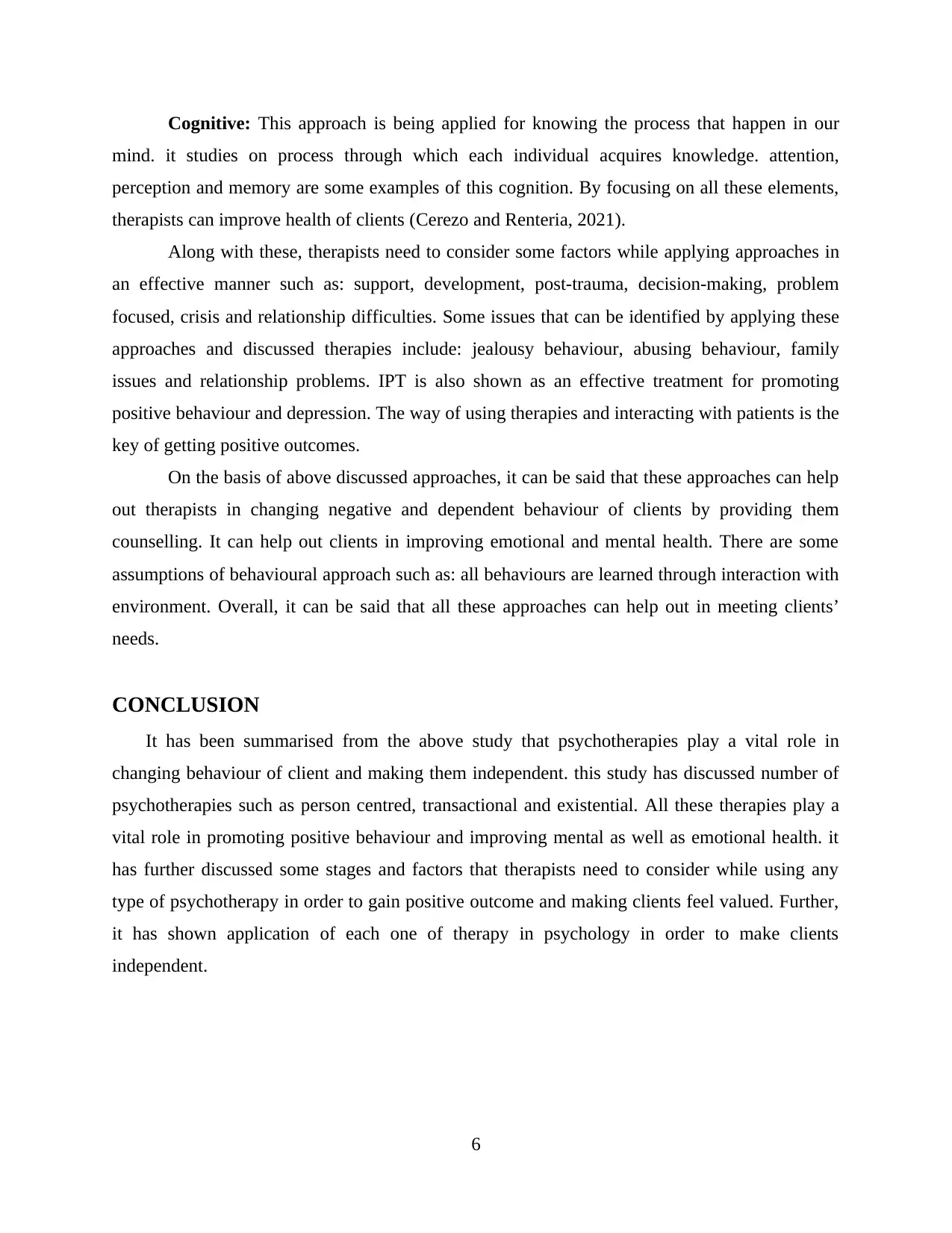
Cognitive: This approach is being applied for knowing the process that happen in our
mind. it studies on process through which each individual acquires knowledge. attention,
perception and memory are some examples of this cognition. By focusing on all these elements,
therapists can improve health of clients (Cerezo and Renteria, 2021).
Along with these, therapists need to consider some factors while applying approaches in
an effective manner such as: support, development, post-trauma, decision-making, problem
focused, crisis and relationship difficulties. Some issues that can be identified by applying these
approaches and discussed therapies include: jealousy behaviour, abusing behaviour, family
issues and relationship problems. IPT is also shown as an effective treatment for promoting
positive behaviour and depression. The way of using therapies and interacting with patients is the
key of getting positive outcomes.
On the basis of above discussed approaches, it can be said that these approaches can help
out therapists in changing negative and dependent behaviour of clients by providing them
counselling. It can help out clients in improving emotional and mental health. There are some
assumptions of behavioural approach such as: all behaviours are learned through interaction with
environment. Overall, it can be said that all these approaches can help out in meeting clients’
needs.
CONCLUSION
It has been summarised from the above study that psychotherapies play a vital role in
changing behaviour of client and making them independent. this study has discussed number of
psychotherapies such as person centred, transactional and existential. All these therapies play a
vital role in promoting positive behaviour and improving mental as well as emotional health. it
has further discussed some stages and factors that therapists need to consider while using any
type of psychotherapy in order to gain positive outcome and making clients feel valued. Further,
it has shown application of each one of therapy in psychology in order to make clients
independent.
6
mind. it studies on process through which each individual acquires knowledge. attention,
perception and memory are some examples of this cognition. By focusing on all these elements,
therapists can improve health of clients (Cerezo and Renteria, 2021).
Along with these, therapists need to consider some factors while applying approaches in
an effective manner such as: support, development, post-trauma, decision-making, problem
focused, crisis and relationship difficulties. Some issues that can be identified by applying these
approaches and discussed therapies include: jealousy behaviour, abusing behaviour, family
issues and relationship problems. IPT is also shown as an effective treatment for promoting
positive behaviour and depression. The way of using therapies and interacting with patients is the
key of getting positive outcomes.
On the basis of above discussed approaches, it can be said that these approaches can help
out therapists in changing negative and dependent behaviour of clients by providing them
counselling. It can help out clients in improving emotional and mental health. There are some
assumptions of behavioural approach such as: all behaviours are learned through interaction with
environment. Overall, it can be said that all these approaches can help out in meeting clients’
needs.
CONCLUSION
It has been summarised from the above study that psychotherapies play a vital role in
changing behaviour of client and making them independent. this study has discussed number of
psychotherapies such as person centred, transactional and existential. All these therapies play a
vital role in promoting positive behaviour and improving mental as well as emotional health. it
has further discussed some stages and factors that therapists need to consider while using any
type of psychotherapy in order to gain positive outcome and making clients feel valued. Further,
it has shown application of each one of therapy in psychology in order to make clients
independent.
6
⊘ This is a preview!⊘
Do you want full access?
Subscribe today to unlock all pages.

Trusted by 1+ million students worldwide
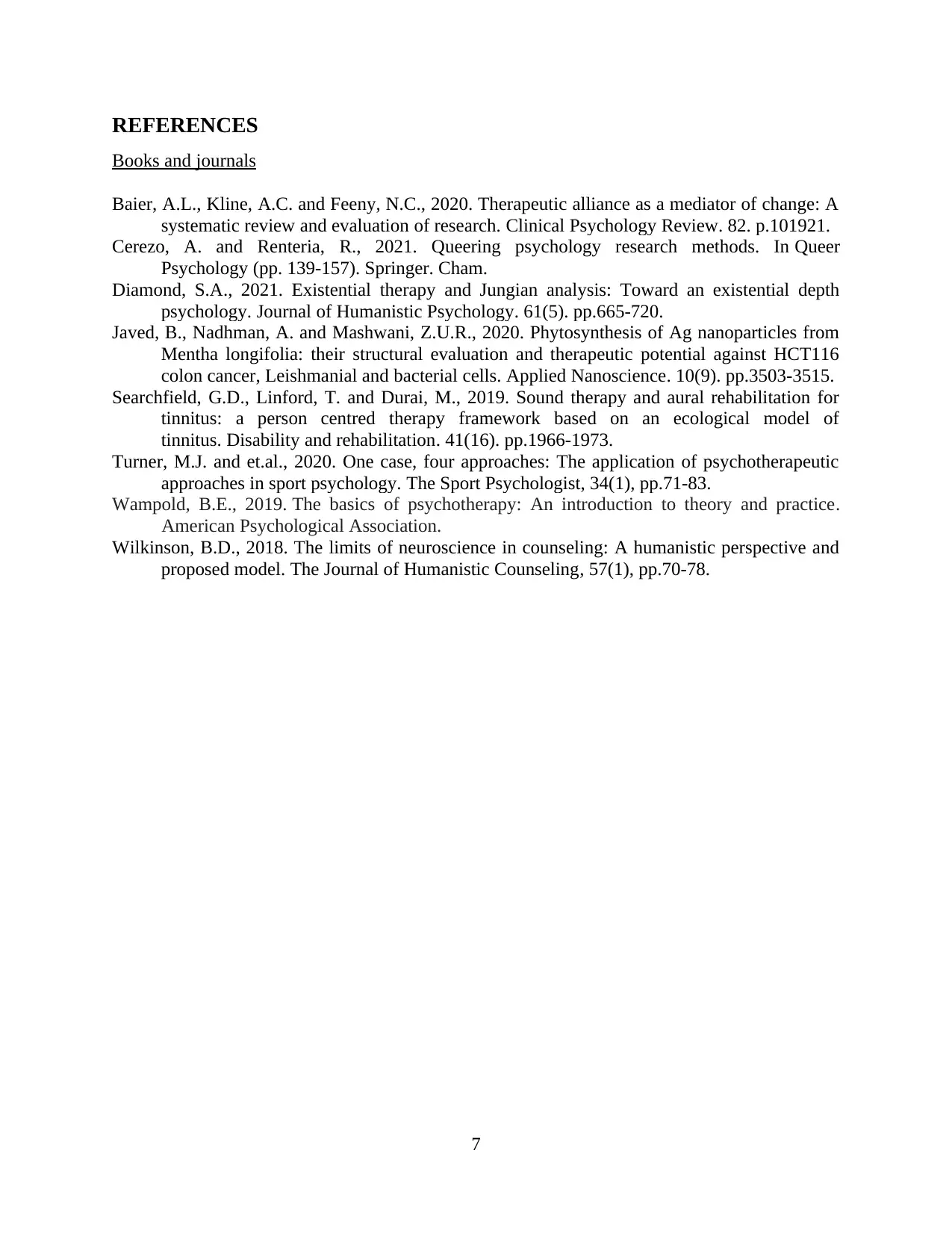
REFERENCES
Books and journals
Baier, A.L., Kline, A.C. and Feeny, N.C., 2020. Therapeutic alliance as a mediator of change: A
systematic review and evaluation of research. Clinical Psychology Review. 82. p.101921.
Cerezo, A. and Renteria, R., 2021. Queering psychology research methods. In Queer
Psychology (pp. 139-157). Springer. Cham.
Diamond, S.A., 2021. Existential therapy and Jungian analysis: Toward an existential depth
psychology. Journal of Humanistic Psychology. 61(5). pp.665-720.
Javed, B., Nadhman, A. and Mashwani, Z.U.R., 2020. Phytosynthesis of Ag nanoparticles from
Mentha longifolia: their structural evaluation and therapeutic potential against HCT116
colon cancer, Leishmanial and bacterial cells. Applied Nanoscience. 10(9). pp.3503-3515.
Searchfield, G.D., Linford, T. and Durai, M., 2019. Sound therapy and aural rehabilitation for
tinnitus: a person centred therapy framework based on an ecological model of
tinnitus. Disability and rehabilitation. 41(16). pp.1966-1973.
Turner, M.J. and et.al., 2020. One case, four approaches: The application of psychotherapeutic
approaches in sport psychology. The Sport Psychologist, 34(1), pp.71-83.
Wampold, B.E., 2019. The basics of psychotherapy: An introduction to theory and practice.
American Psychological Association.
Wilkinson, B.D., 2018. The limits of neuroscience in counseling: A humanistic perspective and
proposed model. The Journal of Humanistic Counseling, 57(1), pp.70-78.
7
Books and journals
Baier, A.L., Kline, A.C. and Feeny, N.C., 2020. Therapeutic alliance as a mediator of change: A
systematic review and evaluation of research. Clinical Psychology Review. 82. p.101921.
Cerezo, A. and Renteria, R., 2021. Queering psychology research methods. In Queer
Psychology (pp. 139-157). Springer. Cham.
Diamond, S.A., 2021. Existential therapy and Jungian analysis: Toward an existential depth
psychology. Journal of Humanistic Psychology. 61(5). pp.665-720.
Javed, B., Nadhman, A. and Mashwani, Z.U.R., 2020. Phytosynthesis of Ag nanoparticles from
Mentha longifolia: their structural evaluation and therapeutic potential against HCT116
colon cancer, Leishmanial and bacterial cells. Applied Nanoscience. 10(9). pp.3503-3515.
Searchfield, G.D., Linford, T. and Durai, M., 2019. Sound therapy and aural rehabilitation for
tinnitus: a person centred therapy framework based on an ecological model of
tinnitus. Disability and rehabilitation. 41(16). pp.1966-1973.
Turner, M.J. and et.al., 2020. One case, four approaches: The application of psychotherapeutic
approaches in sport psychology. The Sport Psychologist, 34(1), pp.71-83.
Wampold, B.E., 2019. The basics of psychotherapy: An introduction to theory and practice.
American Psychological Association.
Wilkinson, B.D., 2018. The limits of neuroscience in counseling: A humanistic perspective and
proposed model. The Journal of Humanistic Counseling, 57(1), pp.70-78.
7
1 out of 7
Related Documents
Your All-in-One AI-Powered Toolkit for Academic Success.
+13062052269
info@desklib.com
Available 24*7 on WhatsApp / Email
![[object Object]](/_next/static/media/star-bottom.7253800d.svg)
Unlock your academic potential
Copyright © 2020–2026 A2Z Services. All Rights Reserved. Developed and managed by ZUCOL.





